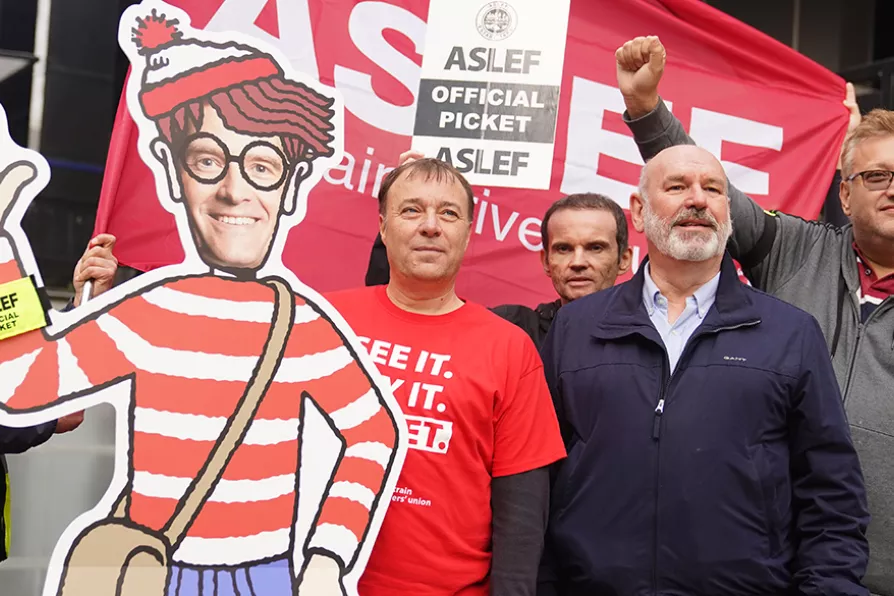Spanish dictator Francisco Franco died 50 years ago today November 20. JIM JUMP looks back at his blood-soaked rule and toxic legacy on Spain today

 ALWAYS RESOLUTE: Aslef picket line at Euston station in London on Wednesday October 4, 2023 - general secretary Mick Whelan (second right)
ALWAYS RESOLUTE: Aslef picket line at Euston station in London on Wednesday October 4, 2023 - general secretary Mick Whelan (second right)
TRAIN drivers will be using a new tactic when they launch their next round of industrial action over pay on December 2.
Instead of a single country-wide stoppage by drivers at all the 16 companies involved in the dispute, the action will be selective, a small number of companies at a time, in a week-long rolling programme of 24-hour stoppages.
The tactic will play havoc across the network. Making connections between services operated by different companies will be almost impossible. Complex journey planning will be a non-starter.
“We will be out in the Midlands one day, then somewhere else the next,” Aslef general secretary Mick Whelan told the Morning Star. “It will affect different routes at different times. It will create a fragmented railway.”
Another overtime ban will also leave operating companies unable to meet their timetables because the operators choose to employ too few drivers to do so, and instead rely on drivers volunteering to work overtime. It’s cheaper to pay drivers to work on their rest days than it is to employ enough drivers to meet the operator’s timetable commitments.
Effectively the operators’ greed has delivered an industrial weapon into the hands of the drivers and their union Aslef.
Mick Whelan says his members are ready once again for the fray. In the 16 months of the dispute, they have lost none of their enthusiasm for action.
“Our members remain strong,” he told the Morning Star. “They want to do this.”
The action starts on Saturday December 2 when drivers will walk out at East Midlands Railway and London and North East Railway.
On Sunday Avanti West Coast, Chiltern, Great Northern, Thameslink, and West Midlands Trains will be hit.
C2C and Greater Anglia will be affected on Tuesday December 5, Southeastern, Southern, Gatwick Express, SWR main line, SWR depot drivers, and Island Line will be out on Wednesday December 6. Drivers at CrossCountry and GWR strike on Thursday December 7, and Northern and TPT on Friday December 8.
No overtime will be worked from Friday December 1 until Saturday December 9.
The new plan of action was drawn up shortly after Transport Secretary Mark Harper ingenuously told the Commons that Aslef should be putting a “new” pay proposal to its members.
“He forgot to mention that it has already been rejected so it’s not ‘on the table’,” said Whelan.
The drivers’ response to the last proposal was to vote for strike action in even more overwhelming numbers. The vote was no doubt due in part to the fact that the deal was conditional on the drivers giving up working arrangements and agreements fought for over decades.
Pickets will be in action as usual on Saturday.
If the drivers’ enthusiasm for industrial action has been one constant for the last 16 months, support from the public is another, said Whelan. He believes the fact that millions of workers have been involved in their own industrial action over the last two years helps them identify and sympathise with the train drivers’ struggle.
“There isn’t a family in the country that hasn’t had someone involved in industrial action — NHS, teachers, Civil Service, transport,” he said. “Everybody has been fighting for their futures.
“Yes, we still have the support of the public for which we are eternally grateful. Tea, cake, coffee on the picket lines, car horns being parped.
“We’ve never seen such public support — summer, then winter, then summer and now winter again. It’s been solid.”
Whelan also hammers home the message about why the dispute is dragging on so long, and why no settlement has been reached.
“Our trade union has reached 14 pay deals with rail companies in the last 12 months,” he said. “They include freight companies, open access operators, Eurostar, and passenger companies in Scotland and Wales where transport is devolved.
“The only companies where we have problems are those where there is government involvement. They are the only ones. And we have heard nothing from them for five months. Yet here we are, willing to talk.”
Another factor in the longevity of the dispute is that the government has ensured that the rail-operating companies have no financial incentive to settle with the drivers.
The original franchises awarded to the first privateer train-operating companies in 1993 included a clause under which the government pays operating companies compensation for any profits lost due to industrial action.
So the operators can sit back, pocket their usual hundreds of millions of pounds in public subsidies, and also bank the extra cash forked out by taxpayers to compensate them for income lost through industrial action.
Shareholders have nothing to lose — the taxpayer-funded profits keep rolling in without a single train wheel being turned and to hell with the inconvenience caused to millions of passengers.
The train drivers have staged 14 one-day strikes and seven bans on overtime since the dispute began in June 2022.
The indications are that the dispute will not be settled until either the government changes its mind or voters change the government.














